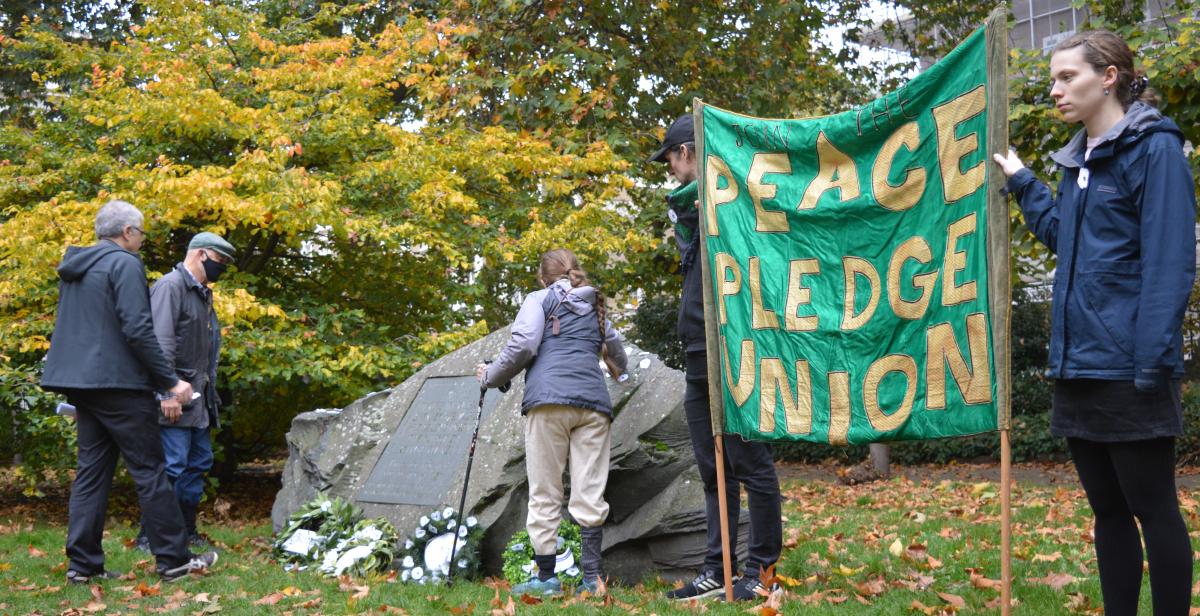White poppy wreaths laid around the UK on Remembrance Sunday

White poppy wreaths laid around the UK on Remembrance Sunday
Wreaths of white poppies have today been laid in more than 20 towns and cities in the UK to remember all victims of war.
White poppy wearers held Alternative Remembrance Ceremonies in cities including London, Edinburgh, Glasgow, Brighton and Derry/Londonderry as well as many smaller towns.
White poppies also appeared in a higher than usual number of official ceremonies, in places including Leicester, Aberystwyth and Ipswich. Leicester Univesrity has placed mixed wreaths of red and white poppies at several places in Leicester, Leicestershire and Rutland.
White poppies represent remembrance for all victims of war of all nationalities, along with a commitment to peace and a rejection of militarism. They were founded in 1933 by the Co-operative Women’s Guild. Since 1981 they have been organised and distributed by the Peace Pledge Union (PPU).
The PPU reported this evening that they were aware of white poppy wreaths being placed in Aberystwyth, Bridgewater, Brighton, Bromley, Bury St Edmunds, Clevedon, Derry/Londonderry, Edinburgh, Exeter, Glasgow, Guildford, Hexham, Ipswich, Lambeth, Leamington Spa, Leicester, London, Luton, Margate, Oldham, Paisley, Skipton, Stowmarket and Uxbridge. There may well have been others of which the PPU nationally has not yet been informed.
This year has seen growing acceptance of white poppies as part of war remembrance in the UK. The number of shops and other outlets selling white poppies has more than doubled in the last five years and more schools are now making white poppies available alongside red poppies.
Welsh former rugby player Rhodri Gomer wore a white poppy as he appeared on television today, following other celebrities such as comedian Kate Smurthwaite, who recently defended her white poppy on Channel 5.
Hundreds of people took part in today’s National Alternative Remembrance Ceremony, either in person in Tavistock Square, London, or through joining online.
After short contributions from speakers, two minutes’ silence was held for all victims of war, civilian and military, of all nationalities. The PPU’s Katherine Allsopp then laid a wreath of white poppies on behalf of the PPU, followed by wreaths from Conscience and the Fellowship of Reconciliation, and a wreath laid by children to remember children killed in war.
They were welcomed to the ceremony by the PPU’s Anya Nanning Ramamurthy, who had travelled from Glasgow where she had been campaigning about thee links between climate change and militarism during COP26.
“We gather here today to remember all victims of war,” said Anya. “Victims of all wars, past and present, all sides, all conflicts, all nationalities, civilians and those on the front line fighting… People who were killed, people who were imprisoned, communities who have been torn apart and who continue to be torn apart." She added, “We also gather to show our commitment to peace and challenge attempts to glamorise or celebrate war.”
Hamit Dardagan of Iraq Body Count spoke of the need to remember civilian as well as military victims of war. “Each victim had a name,” he said. “Each was an individual, as individual as you and me.”
Huda Ammori, co-founder of Palestine Action, said that the ceremony was “important and an amazing opportunity” to remember all victims of war.
Many participants were visibly moved, some to tears, as Huda spoke of her own family’s experience of war in Iraq and Palestine, including her uncle being beaten by US soldiers in Iraq in front of his children. She expressed her horror at seeing trauma normalised in the life of her relatives and their communiites.
Huda, who has often taken nonviolent direct action against the arms trade, finished by saying, “I ask today, while we reflect and remember and grieve for all those killed by war and colonialism, we also reflect on our own positions and what we can do in order to stop this from where we are.”
Participants at the London ceremony included PPU member Richard Barnard, who was able to attend the ceremony only because of an exemption from bail conditions that prevent him travelling to London as he awaits trial for taking nonviolent direct action against the arms industry. A court allowed Richard to go to London as long as he confined himself to attending the Remembrance ceremony. Richard pointed out that the same values that lead him to remember the dead also lead him to resist war. The National Alternative Remembrance Sunday Ceremony can be viewed in full online.
Meanwhile, retired colonel Richard Kemp and former head of the army Richard Dannatt criticised Leicester University for laying mixed wreaths of white and red poppies. The PPU refuted Kemp’s accusation that white poppies are an “insult to the dead”, pointing out they are a symbol of remembrance for the dead, including all victims of war, both civilian and military, of all nationalities.
(Above: National Alternative Remembrance Sunday Ceremony, London. Photo credit: Philip Wood.)




